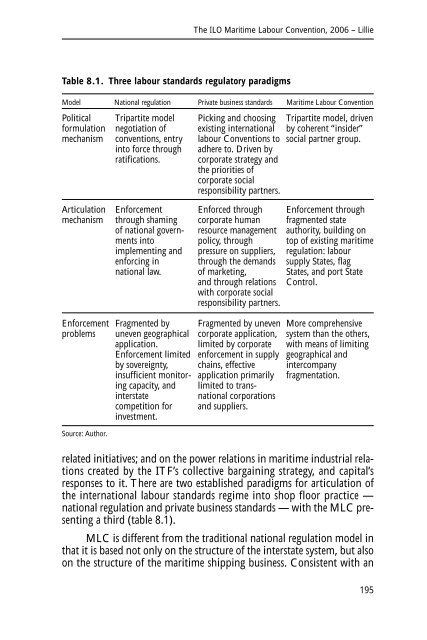CROSS-BORDER SOCIAL DIALOGUE AND AGREEMENTS: An ...
CROSS-BORDER SOCIAL DIALOGUE AND AGREEMENTS: An ...
CROSS-BORDER SOCIAL DIALOGUE AND AGREEMENTS: An ...
You also want an ePaper? Increase the reach of your titles
YUMPU automatically turns print PDFs into web optimized ePapers that Google loves.
The ILO Maritime Labour Convention, 2006 – Lillie<br />
Table 8.1. Three labour standards regulatory paradigms<br />
Model National regulation Private business standards Maritime Labour Convention<br />
Political<br />
formulation<br />
mechanism<br />
Tripartite model<br />
negotiation of<br />
conventions, entry<br />
into force through<br />
ratifications.<br />
Picking and choosing<br />
existing international<br />
labour Conventions to<br />
adhere to. Driven by<br />
corporate strategy and<br />
the priorities of<br />
corporate social<br />
responsibility partners.<br />
Tripartite model, driven<br />
by coherent “insider”<br />
social partner group.<br />
Articulation<br />
mechanism<br />
Enforcement<br />
through shaming<br />
of national governments<br />
into<br />
implementing and<br />
enforcing in<br />
national law.<br />
Enforced through<br />
corporate human<br />
resource management<br />
policy, through<br />
pressure on suppliers,<br />
through the demands<br />
of marketing,<br />
and through relations<br />
with corporate social<br />
responsibility partners.<br />
Enforcement through<br />
fragmented state<br />
authority, building on<br />
top of existing maritime<br />
regulation: labour<br />
supply States, flag<br />
States, and port State<br />
Control.<br />
Enforcement<br />
problems<br />
Fragmented by<br />
uneven geographical<br />
application.<br />
Enforcement limited<br />
by sovereignty,<br />
insufficient monitoring<br />
capacity, and<br />
interstate<br />
competition for<br />
investment.<br />
Fragmented by uneven<br />
corporate application,<br />
limited by corporate<br />
enforcement in supply<br />
chains, effective<br />
application primarily<br />
limited to transnational<br />
corporations<br />
and suppliers.<br />
More comprehensive<br />
system than the others,<br />
with means of limiting<br />
geographical and<br />
intercompany<br />
fragmentation.<br />
Source: Author.<br />
related initiatives; and on the power relations in maritime industrial relations<br />
created by the ITF’s collective bargaining strategy, and capital’s<br />
responses to it. There are two established paradigms for articulation of<br />
the international labour standards regime into shop floor practice —<br />
national regulation and private business standards — with the MLC presenting<br />
a third (table 8.1).<br />
MLC is different from the traditional national regulation model in<br />
that it is based not only on the structure of the interstate system, but also<br />
on the structure of the maritime shipping business. Consistent with an<br />
195
















